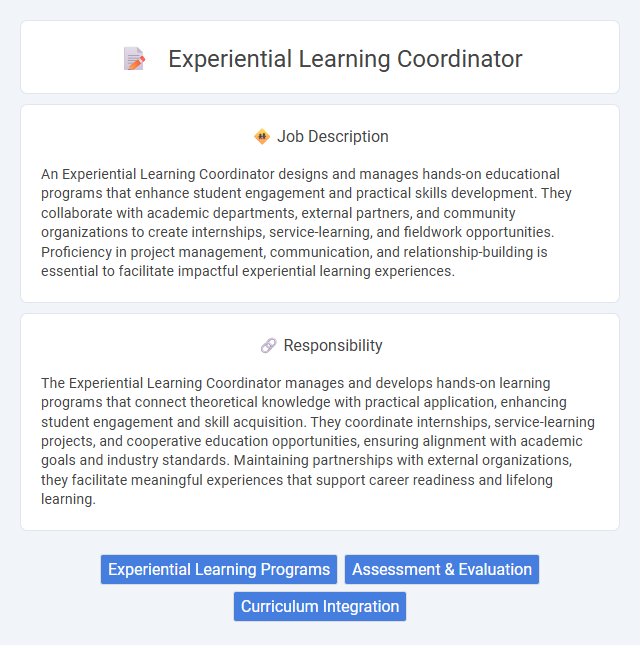
An Experiential Learning Coordinator designs and manages hands-on educational programs that enhance student engagement and practical skills development. They collaborate with academic departments, external partners, and community organizations to create internships, service-learning, and fieldwork opportunities. Proficiency in project management, communication, and relationship-building is essential to facilitate impactful experiential learning experiences.
Individuals who thrive in dynamic environments with strong organizational skills and a passion for hands-on education will likely find the role of an Experiential Learning Coordinator suitable. Those who enjoy facilitating student engagement and fostering practical learning opportunities may experience job satisfaction in this position. Candidates lacking effective communication or multitasking abilities may find the demands of coordinating experiential programs challenging.
Qualification
An Experiential Learning Coordinator typically requires a bachelor's degree in education, psychology, or a related field, with a preference for candidates holding a master's degree in experiential education or instructional design. Essential qualifications include strong project management skills, experience in coordinating internships, service learning, or cooperative education programs, and proficiency in assessing learning outcomes. Expertise in student engagement strategies, familiarity with educational technology, and excellent communication skills are critical for success in this role.
Responsibility
The Experiential Learning Coordinator manages and develops hands-on learning programs that connect theoretical knowledge with practical application, enhancing student engagement and skill acquisition. They coordinate internships, service-learning projects, and cooperative education opportunities, ensuring alignment with academic goals and industry standards. Maintaining partnerships with external organizations, they facilitate meaningful experiences that support career readiness and lifelong learning.
Benefit
Experiential Learning Coordinator roles likely offer significant benefits such as enhancing student engagement and practical skills through hands-on learning opportunities. These positions may improve career readiness by fostering real-world experience and industry connections. Organizations probably see improved student outcomes and stronger community partnerships as key advantages.
Challenge
The role of an Experiential Learning Coordinator likely involves overcoming challenges related to designing and implementing hands-on educational programs that effectively engage diverse learners. It probably requires navigating logistical complexities and coordinating partnerships with external organizations to provide meaningful real-world experiences. Managing student expectations and ensuring alignment with curriculum goals may also present ongoing difficulties.
Career Advancement
Experiential Learning Coordinators facilitate hands-on educational opportunities that bridge classroom theory and real-world application, enhancing student career readiness. By designing and managing internships, co-ops, and service-learning programs, they help students develop critical skills sought by employers, accelerating career advancement. Expertise in industry partnerships and program evaluation sharpens their ability to create impactful learning experiences that drive professional growth.
Key Terms
Experiential Learning Programs
Experiential Learning Coordinators develop and manage hands-on programs designed to enhance student engagement through real-world experiences such as internships, service learning, and study abroad opportunities. They collaborate with academic departments, community partners, and employers to create meaningful, outcomes-driven projects that promote critical thinking and professional skills development. By assessing program effectiveness using qualitative and quantitative data, these coordinators ensure continuous improvement and alignment with educational goals.
Assessment & Evaluation
Experiential Learning Coordinators develop and implement robust assessment frameworks to measure student learning outcomes from hands-on activities, internships, and real-world projects. They utilize qualitative and quantitative evaluation methods to ensure that experiential programs align with academic standards and enhance skill development. Data-driven insights gathered through these assessments inform continuous improvement strategies and demonstrate program effectiveness to stakeholders.
Curriculum Integration
Experiential Learning Coordinators design and implement hands-on educational programs that seamlessly integrate real-world experiences with academic curricula, enhancing student engagement and retention. They collaborate closely with faculty to align experiential activities with learning objectives, ensuring that practical applications reinforce theoretical knowledge. By leveraging community partnerships and industry connections, they facilitate meaningful internships, service learning, and project-based opportunities that enrich curriculum outcomes.
 kuljobs.com
kuljobs.com